CEA Alliance Applauds Introduction of Bipartisan Senate Bill to Scale Supply Chain Loan Guarantee Program at USDA
Read the full story from HortiDaily …
Read the full story from HortiDaily …
 New York-based controlled environment agriculture company Square Roots has unveiled a program that aims to remove lighting from commercial indoor vertical farming systems to reduce energy demands and costs.
New York-based controlled environment agriculture company Square Roots has unveiled a program that aims to remove lighting from commercial indoor vertical farming systems to reduce energy demands and costs.
Through partnerships and focused research, the company says it is exploring techniques like heterotrophic growing to operate indoor farms in the dark, with the goal of lower production costs and environmental impact while maintaining year-round fresh food production.
“Over the last 12 months Square Roots has created a platform to accelerate agricultural research, working with partners across both indoor and outdoor farming, alongside science-focused organizations and foundations,” Square Roots co-founder and CEO Tobias Peggs told The Packer.
The program seeks to demonstrate that light can be removed from a commercial indoor vertical farming system; the benefits of indoor farming remain, but the system can now operate with radically reduced energy needs. This translates directly to significantly lower production costs and associated carbon dioxide equivalent, or CO2e, he said.
To enable this new approach, Square Roots is working with gene-edited CRISPR plants that add biomass by uptaking carbon through their root systems rather than relying on photosynthesis under light. The underlying science was initially developed by Robert Jinkerson, a specialist in artificial photosynthesis at the University of California, Riverside, in conjunction with Feng Jiao, a chemist at the University of Delaware.
 For greenhouse growers, the siren song of growth and expansion is undeniable. It whispers increased yields, broader markets and greater financial stability. But like any seductive melody, it masks a treacherous undertow. While brimming with potential, challenges lurk unseen, ready to overwhelm with complexities, resource strains and logistical nightmares.
For greenhouse growers, the siren song of growth and expansion is undeniable. It whispers increased yields, broader markets and greater financial stability. But like any seductive melody, it masks a treacherous undertow. While brimming with potential, challenges lurk unseen, ready to overwhelm with complexities, resource strains and logistical nightmares.
A fundamental entrepreneurial principle, especially relevant for greenhouse growers, is that expansion should be a deliberate strategic decision, not solely a reaction to opportunity. This principle rings true for Brooklyn, New York-based Gotham Greens, which has navigated numerous recent expansion projects with calculated precision. Led by the visionary leadership of co-founders Viraj Puri (CEO) and Eric Haley (CFO) and Chief Greenhouse Officer Jenn Frymark and supported by a dedicated internal team of horticulture pros, Gotham Greens carefully examined every expansion challenge and established effective best practices. This has empowered the grower to overcome the complexities of a revolutionary way of growing and providing fresh produce in the U.S.
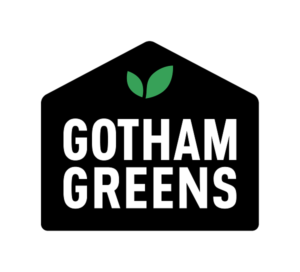 Today, Gotham Greens is synonymous with urban agriculture and cutting-edge, sustainable growing practices, and its growth and expansion wouldn’t be done justice without highlighting its rapid ascent in the greenhouse grower market.
Today, Gotham Greens is synonymous with urban agriculture and cutting-edge, sustainable growing practices, and its growth and expansion wouldn’t be done justice without highlighting its rapid ascent in the greenhouse grower market.
Its legacy is rooted in the heart of Brooklyn, New York, an urban, culturally diverse foodie paradise. In 2009, Puri and Haley collaborated on a shared dream to provide fresh, pesticide-free, sustainably grown produce directly to local communities. Two years later, the vision materialized on a Greenpoint neighborhood rooftop with Gotham Greens’ first 15,000-square-foot soilless hydroponic greenhouse, marking a milestone in traditional farming. At its heart, this revolutionary model addressed long-held agricultural challenges — how to overcome long distances, mitigate environmental impact and provide greater access to fresh, locally produced foods.
Orbia’s Precision Agriculture business, Netafim (Indoor Ag-Con 2024 Exhibitor!) has partnered with Vermillion Growers to build a large-scale vegetable greenhouse in Manitoba, Canada. Gakon Netafim, the company’s commercial greenhouse project division, is a world-renowned leader in Controlled Environment Agriculture (CEA). The facility celebrated its grand opening on July 27, 2023, a significant milestone for Orbia, Vermillion Growers, and the local community.
Based in Dauphin, Vermillion Growers will begin growing tomatoes year-round across 10 acres, with plans to expand their production area and grow additional crops. Canada currently imports over 75% of its vegetables and 50% of its tomatoes. By reducing shipping time, customers can get fresh, higher-quality tomatoes at their local grocery stores, even in remote communities. By reducing transit time and the resulting spoilage, this exciting new development also cuts down on food waste.
Orbia Precision Agriculture Technology to Support Sustainable Practices
Gakon Netafim’s greenhouse solutions make it possible, and profitable, to meet consumers’ preferences for local produce that is grown sustainably.
The roof structure on the greenhouse will collect enough water to meet 50% of the entire facility’s irrigation needs. Additionally, the double-screen system minimizes light pollution and reduces the overall energy used by 50%. “The double-screen technology is optimal for controlling the climate in the greenhouse and allows for greater energy savings and efficiency,” says Ricky Elz, Greenhouse Key Account Project Manager at Gakon Netafim. “The blackout screens provide shading to crops and are essential to crop growth in the greenhouse.”
“Our partnership with Vermillion Growers is an exciting part of our Greenhouse Business and I’m excited for what comes next. All of us at Orbia are proud to play a role in positively impacting the many communities of Manitoba,” said Claude Corcos, Vice President of Strategy & Business Development at Orbia’s Precision Agriculture business, Netafim USA.
Economic Benefits and Community Impact
Since Vermillion Growers’ opening, it has hired 30 new full-time employees and will eventually bring over 200 jobs to the community. Vermillion has further partnered with Assiniboine Community College, a local college in Dauphin which will begin offering a Horticultural Production program this fall to provide education and training to those in the community who are interested in pursuing work in the field, including work at Vermillion Growers.
Notably, Vermillion Growers has provided job training and support to several workers who relocated from Ukraine to escape from conflict. Per Capita, Dauphin has one of the largest Ukrainian populations in Canada.
“The combination of world-class greenhouse technology and local expertise is why Vermillion invested in Gakon Netafim solutions,” says Maria Deschauer, managing director of Vermillion Growers. “We prioritize growing fresh produce, as well as healthy people and sustainable communities. All three are connected and we are thrilled for their support.”
About Netafim
Netafim, Orbia’s Precision Agriculture business, is the world’s largest irrigation company and a global leader in precision agriculture solutions committed to fight scarcity of food, water and land, for a sustainable future. Founded in 1965, Netafim pioneered the drip revolution, creating a paradigm shift toward precision irrigation. Today, specializing in end-to-end solutions from the water source to the root zone, Netafim delivers irrigation and greenhouse projects, as well as landscape and mining irrigation solutions supported by engineering, project management and financing services. Netafim is also leading the way in digital farming, irrigation and fertigation, integrating real-time monitoring, analysis and automated control into one state-of-the-art system. With 33 subsidiaries, 19 manufacturing plants, 2 recycling plants and more than 5000 employees worldwide, Netafim delivers innovative, tailor-made irrigation and fertigation solutions to millions of farmers, allowing smallholders to large-scale agricultural producers and investors, in over 110 countries, to grow more with less™.
About Orbia
Orbia is a company driven by a shared purpose: to advance life around the world. Orbia operates in the Polymer Solutions (Vestolit and Alphagary), Building and Infrastructure (Wavin), Precision Agriculture (Netafim), Connectivity Solutions (Dura-Line) and Fluorinated Solutions (Koura) sectors. The five Orbia business groups have a collective focus on expanding access to health and wellness, reinventing the future of cities and homes, ensuring food and water security, connecting communities to information and accelerating a circular economy with basic and advanced materials, specialty products and innovative solutions. Orbia has commercial activities in more than 110 countries and operations in over 50, with global headquarters in Boston, Mexico City, Amsterdam and Tel Aviv.
About Vermillion Growers
Vermillion Growers is the first large-scale vegetable greenhouse in Manitoba, Canada. Its mission is to grow high-quality produce, healthy people, and sustainable communities. The greenhouse is helping to bridge the gap in food production in Central Canada by producing fresh tomatoes year-round. Vermillion Growers utilizes industry-leading technology to operate an efficient and environmentally sustainable facility.
February 14, 2023 – Indoor Ag-Con is excited to announce the latest addition to its headliner keynote schedule for the upcoming February 27-28, 2023 edition at Caesars Forum Las Vegas. Titled “The Ever-Changing Business Model of Controlled Environment Agriculture Farming,” this keynote panel will be moderated by Vonnie Estes, Vice President of Technology, International Fresh Produce Association (IFPA), and will feature Steve Platt, CEO, BrightFarms; Matt Ryan, CEO, Soli Organic; and Dave Vosburg, CIO, Local Bounti. The keynote is scheduled for Monday, February 27, 2023 at 11 am PST.
“From greenhouse growing operations and indoor vertical farms to heavy labor and automation, it seems like the CEA industry has an identity crisis. The business model is often in flux between being a produce provider or a technology provider,” says Brian Sullivan, CEO, Indoor Ag-Con. “Our panel of CEA industry leaders will explore the reasons for this shift and offer predictions on where the business model is headed in the future.”
This panel joins the Indoor Ag-Con 2023 CEO headliner keynote line-up, which also includes the opening morning kick-off session with Arama Kukutai, CEO, Plenty and the day two morning keynote from Dave Chen, CEO, Equilibrium, as well as full roster of panels, debates and fireside chats.
Keynote panel participants include:
VONNIE ESTES, VICE PRESIDENT OF TECHNOLOGY, IFPA
Vonnie’s role as VP of Technology at the IFPA is to bring technology to the produce industry across the supply chain, working with both technology companies and the industry to identify and solve pressing needs. Her career has been driven by a passion for agriculture, technology and sustainability. She has held leadership positions at prominent companies including DuPont, Monsanto, and Syngenta along with start-ups including DNAP, Emergent Genetics, and Caribou Biosciences to identify revolutionary science and bring products to market. Vonnie is a sought-after voice, speaking and publishing frequently.
STEVE PLATT, CEO, BRIGHTFARMS
Steve Platt is CEO of the mission-driven indoor farming leader BrightFarms, and a veteran CPG executive with a proven record of growing brands. Under Steve’s leadership, BrightFarms was acquired by lead investor Cox Enterprises in 2021, resulting in a clear roadmap for future growth and a positive exit for initial investors. His passion for BrightFarms’ mission and products led him to the company, which grows pesticide-free leafy greens in its 6 high-tech facilities across the country. Before joining BrightFarms, he was CEO of Icelandic Provisions, where he led the company to become the fastest-growing brand in dairy yogurt. Previously, he was an Executive at Danone, spearheading brands like Dannon, Oikos, Danimals and YoCrunch.
MATT RYAN, CEO, SOLI ORGANIC
Matthew Ryan serves as chief executive officer (CEO) at Soli Organic. As CEO, his focus is on strengthening the company’s competitive advantages and achieving scaled topline growth. Prior to his role at Soli Organic, Ryan served as the chief marketing officer and chief strategy officer at Starbucks where he developed and executed marketing and strategy plans, managed the food and beverage portfolio and led all other marketing, product, brand, and consumer functions. As the head of brand management for The Walt Disney Company, he oversaw the company’s brand management, brand development, franchise management, customer data, and CRM.
DAVE VOSBURG, CIO, LOCAL BOUNTI
Dave Vosburg is Chief Innovation Officer of Local Bounti. With two decades of international financial, business development and technology experience, Dave has spent his life career founding, growing and scaling technology businesses that create social value. Previously he was CFO and Head of Emerging Technology at Sensei Ag, a market changing AgTech venture founded by Oracle co-founder Larry Ellison. For five years prior, Mr. Vosburg served as CFO and Head of Business Development of Crop One Holdings, a vertical farming company based outside of Boston, MA. He is also Co-Founder of Conception Nurseries, a micro-propagation company based in Sacramento, CA.
2023 CONFERENCE SCHEDULE FEATURES NEW FORMATS, 70+ SPEAKERS
In addition to these headliner keynotes, the 2023 educational conference will also feature insightful panel sessions featured within three comprehensive educational tracks – grower; trends & innovation; and funding & guidance. Attendees can also look forward to new friendly debate formats and fireside chats, too.
EXPANDED EXHIBIT FLOOR
2023 will welcome the largest number of exhibitors in the event’s 10-year history. From irrigation and LED lighting to environmental control systems, substrates, greenhouse equipment, energy solutions, business services and more, attendees will have the chance to see the latest introductions and innovations from vertical farming and controlled environment agriculture leaders in 174 booths.
CO-LOCATION WITH NATIONAL GROCERS ASSOCATION SHOW
Indoor Ag-Con will once again co-locate with the National Grocers Association (NGA) Show, the leading trade show and conference for independent grocers, offering even more networking and business opportunities for attendees and exhibitors alike. The NGA Show and Indoor Ag-Con visitors will have the opportunity to explore both exhibit halls as part of the full conference pass offerings.
MORE NETWORKING
Exhibitors and attendees can enjoy complimentary luncheons on the show floor each day, a show floor cocktail reception, breakout sessions and other opportunities to reconnect with friends and meet new business partners.
QUICK FACTS:
WHEN: Monday, February 27 – Tuesday, February 28, 2023
WHERE: Caesars Forum, 3911 Koval Lane, Las Vegas, NV 89101
INFO: For information on exhibiting or attending visit www.indoor.ag or email suzanne@indoor.ag
ABOUT INDOOR AG-CON LLC
Indoor Ag-Con is the largest US trade event for vertical farming | indoor agriculture |controlled environment agriculture, the practice of growing crops in indoor systems, using hydroponic, aquaponic and aeroponic techniques. Its events are crop-agnostic and touch all sectors of the business, covering produce, legal cannabis | hemp, alternate protein and non-food crops. More information: www.indoor.ag
Indoor Ag-Con is excited to welcome Plenty CEO Arama Kukutai to our keynote stage to give the opening morning address on Monday, February 27, 2023. Ahead of his keynote, we asked Arama about some of the company’s exciting developments; the challenges, trends and opportunities he sees for our industry; and what’s next for Plenty. Read more in this month’s CEO Q&A:
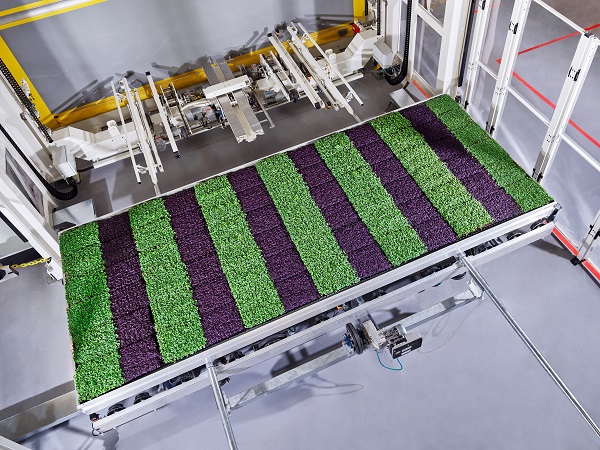 In September of 2022 Plenty announced plans to build the world’s largest indoor vertical farm campus near Richmond, VA. Can you share more details on this exciting project?
In September of 2022 Plenty announced plans to build the world’s largest indoor vertical farm campus near Richmond, VA. Can you share more details on this exciting project?We’re building a first-of-its-kind campus of indoor vertical farms, which is significant for a few reasons. The structure of a cluster of farms on a shared site creates increased efficiencies as well as the opportunity to grow a wider variety of crops at scale on a single site. The Plenty Richmond Farm Campus has a potential annual production capacity of more than 20 million pounds of fresh produce. First up is our strawberry farm, which we broke ground on last fall and expect to deliver berries in market with our partner Driscoll’s in 2024.
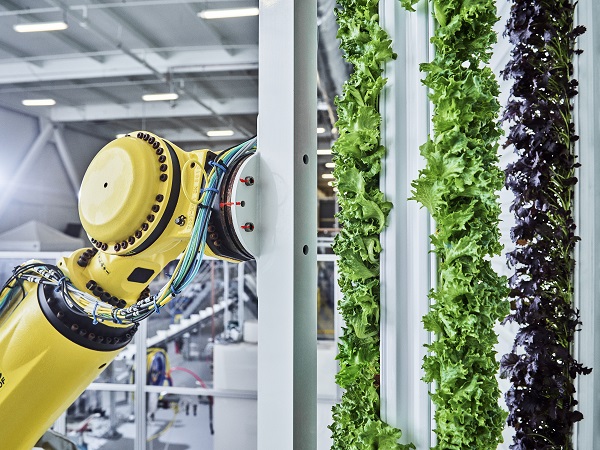
We want to be a part of building a food future where everyone has affordable access to fresh produce. The Plenty Compton Farm, which will be fully operational this year, is our first commercial farm, so it’s the culmination of nearly a decade of R&D and a major step forward in scaling our growing capabilities. We’re proud to be bringing agriculture back to Compton, and working with local retailers to increase affordable access to our produce for California and the western U.S.
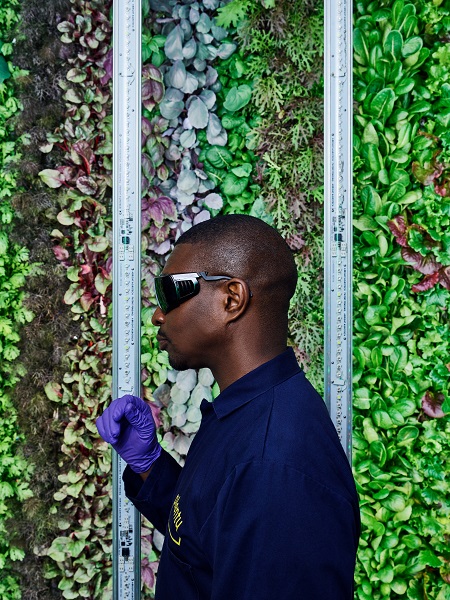 In your opinion, what are the key challenges that the CEA/Vertical Farm industry must overcome?
In your opinion, what are the key challenges that the CEA/Vertical Farm industry must overcome?Achieving scale, and scaling with positive unit economics, is the key challenge vertical farming has to overcome to be a permanent part of our food system. Energy consumption is also a challenge for our industry, so it’s important to prioritize energy efficiency as well as choose locations with access to cleaner energy sources.
There’s so much innovation happening to shape a new future for food that is more sustainable and equitable. The last decade saw more than $120 billion invested in innovation, now it’s time to demonstrate the commercial proof points. I’m most excited about the development of a hybrid agriconomy that brings together vertical farming, cultivation and fermentation to scale food production in ways that are better for the planet.
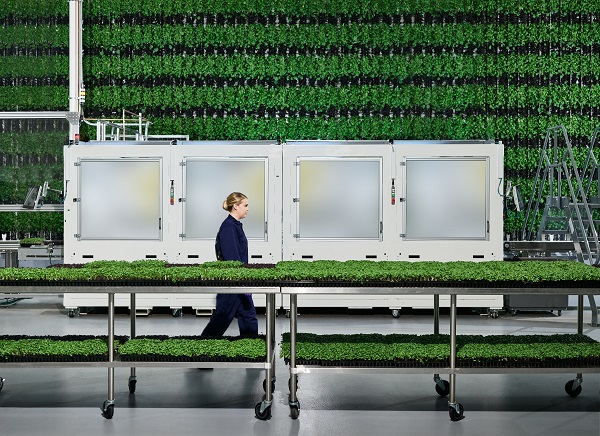 What’s next for Plenty?
What’s next for Plenty?Our focus for the immediate future is applying our technology and plant science R&D to commercial farms so we can scale our reach here in the U.S. and build our first international site. Beyond that, we’re continuing to expand our plant science innovation work to diversify the crops we have in market – strawberries are coming next, tomatoes and more are on the horizon. We are also going to announce new partnerships around financing the indoor asset class.
To learn more about Plenty, visit the website. And, make plans to join us for the 10th Anniversary Edition of Indoor Ag-Con, February 27-28, 2023 to hear Arama’s keynote address AND be part of the largest vertical farming & controlled environment agriculture gathering in the USA! Learn more.
Indoor Ag-Con 2021 Exhibitor ZipGrow has expanded its footprint, moving from leased premises to its own building at the corner of Cumberland and Seventh Street in Cornwall, Ontario Canada. The new building more than doubles the amount of space available to the manufacturer of the world’s most installed vertical hydroponic equipment.
“Demand for our products continues to soar,” says Eric Lang, President of ZipGrow. “The new building allows us to be more efficient while at the same time giving us room to grow in the future.”
Growth is on the menu at ZipGrow, with the company launching an innovative partnership with Sodexo to introduce sustainable growing systems to facilities throughout Canada and the United States.
“Having been installed throughout the world over the past decade, our system enables growers, both big and small, to access fresh produce no matter where they are located”, explains Mr. Lang. “We are excited to move ahead with this new partnership with Sodexo. Together we will be able to introduce sustainable food to Sodexo locations throughout North America.”
ZipGrow technology is a patented system that utilizes both hydroponic growing systems and vertical planes to maximize production volume within a small footprint. Primarily growing leafy greens such as lettuce and kale, along with herbs and small fruiting crops such as strawberries, ZipGrow systems will be installed in Sodexo locations including educational institutions, conference facilities, and corporate food service centres.
“This new partnership with ZipGrow not only enables us to reduce our carbon emissions of distance traveled for food source, onsite food waste, and packaging requirements, but also to introduce innovative technology to our facilities and team members”, said Normand St-Gelais, Director of Corporate Responsibility, Sodexo Canada.
ZipGrow is an international leader in indoor, vertical farming technology. The company’s flagship product, the ZipGrow Tower, is a core component of many of the world’s most innovative farms; from indoor hydroponic warehouses to vertical aquaponic greenhouses and high-density container farms
Story sourced from from Choosecornwall.ca
 The UN World Food Programme recently announced that over a quarter of a billion people around the globe could suffer acute hunger by end of this year in large part owing to the coronavirus crisis — a doubling of the 130 million people estimated to experience severe food shortages last year.
The UN World Food Programme recently announced that over a quarter of a billion people around the globe could suffer acute hunger by end of this year in large part owing to the coronavirus crisis — a doubling of the 130 million people estimated to experience severe food shortages last year.
Such forecast makes all the more notable the three-way split screen that has been flickering in the news recently across the United States — showcasing barren shelves at grocery stores, miles of cars and people lined up at food banks, and milk by the millions of gallons being dumped in Wisconsin and Ohio as well as tons of fresh vegetables being plowed back into the soil in Idaho and Florida.
As jarringly incongruous and disturbing such split-screen images are, they have helped bring into stark relief the surprisingly sclerotic rigidity of the U.S. food supply chain amid the prodigious disruptions caused by the coronavirus pandemic.
At the heart of America’s fresh-produce supply-chain predicament in the time of Covid-19 are the double strands that make up this supply chain — running in parallel and perhaps even looping around each other, but never quite meeting and converging.
One supply-chain strand supplies the food service channels of restaurants, schools, hotels, offices and coffee shops, while the second strand supplies the retail channels of grocery stores, supermarkets and other retail outlets.
Never do these two fresh-produce supply-chain strands converge in normal times, but remain distinctly discrete and resolutely independent of one other.
And this explains how when Covid-19 shuttered in quick succession myriads of restaurants, schools and coffee shops across the country, the producers and the roughly 15,000 suppliers that cater to the $300-billion U.S. food service industry are suddenly unable to sell the bulk of their produce.
And in attempting to pivot from the food service supply chain to the retail supply chain, they find themselves confronted, not only with the time-consuming and costly repackaging and relabeling requirements for their produce, but also with the daunting task under time duress of finding proper contacts as well as developing the needed contracts to deliver and sell their produce through the retail supply chain instead.
With many producers and food service suppliers completely unprepared and ill-equipped to accomplish the foregoing, many are forced to make the final dreadful choice of destroying millions of pounds of fresh food that they can no longer sell.
The industry trade group Produce Marketing Association estimates that an approximately $5-billion worth of fresh fruits and vegetables have already gone to waste in the United States.
Thus, redesigning America’s fresh-produce supply chain post Covid-19 to make it certainly more nimble and flexible in routing and rerouting as needed the logistical paths that connect from which farms to which tables is absolutely imperative.
Equally imperative in such redesign is also to make the fresh-produce supply chain definitively more inclusive and sustainable.
Here are six essential touchstones that should inform the much-needed re-engineering of America’s double-stranded fresh-produce supply chain after Covid-19.
(1) Regionally and locally-based — greater geographical proximity between the re-engineered supply-chain sources (producers) and sinks (retailers and food service providers) fosters increased resilience in terms of shorter distance, quicker access to produce, and allowing for time to repackage and relabel produce in events where there is need to switch supply-chain strands; proximity also promotes sustainability in terms of shorter food miles, lower concomitant greenhouse-gas emissions, less food waste during transport as well as greater produce quality and freshness;
(2) Inclusion of small and medium-scale producers — Addition of medium and small-scale producers in the re-engineered supply chain not only promotes economic inclusivity, but fortifies the supply chain’s resilience given the relative ability of medium and small-scale producers to react more quickly and nimbly to projected changes in demands in the supply-chain sinks;
(3) Mixing of food service and retail clients in the chains — Combining to the extent possible food service and retail sinks in the re-engineered supply chains fosters resilience in regard to establishing and maintaining clients in both strands of the supply chain, and thus providing greater facility in events where produce needs rerouting from one supply-chain strand to the other.
(4) Inclusion of indoor and/or vertical farm producers — Addition of indoor and/or vertical farms significantly boosts the resilience of the re-engineered supply chain in terms of increased supply reliability (independent of weather, season, climate and geography), higher produce yield and quality, increased food safety owing to cleaner and controlled-environment operations, and amenability to automation of operations for labor efficiency. The recent decision by Wendy’s, for instance, to source all of its tomatoes for all of its 6,000 restaurants across North America from indoor hydroponic greenhouses has helped enable the American fast-food company to uphold its motto of Always Fresh by way of ensured quality as well as enhanced food safety, predictability, reliability and product traceability for its now far more dependable fresh-tomato supply chain;
(5) Linking producer farms with sources of renewable energy — Incentivizing and linking producer farms to ready sources of renewable energy, including solar and wind power plants, promotes enhanced environmental sustainability. Especially in temperate regions with reduced solar irradiance in certain periods of the year, producer farms may also be linked with wastewater treatment plants that generate renewable natural gas from digested organic wastes as exemplified by the Newtown Creek Watewater Treatment Plant in Brooklyn, New York City; and,
(6) Certification of the supply chain nexus — Certification for resilience, inclusiveness and sustainability (that is, a RISe certification) adjudicated and awarded by an independent body to supply-chain nexus of producers, suppliers and retail/food service clients would be a great boon to the fresh-produce distribution industry as well as to consumers, the general public and the environment.
With Covid-19 temporarily decimating the global economy and in the process exposing the vulnerability of partial paralysis of the American fresh-produce supply chain amid the chaotic disruptions wrought by the pandemic, a silver lining that has emerged is that America’s fresh-produce supply chain can very well be re-engineered for a much-needed upgrade — toward greater resilience, inclusiveness and sustainability.
_______________________________
Dr. Joel L. Cuello is Vice Chair of the Association for Vertical Farming (AVF) and Professor of Biosystems Engineering at The University of Arizona. In addition to conducting research and designs on vertical farming and cell-based bioreactors, he also teaches “Integrated Engineered Solutions in the Food-Water-Energy Nexus” and “Globalization, Sustainability & Innovation”. Email cuelloj@arizona.edu.